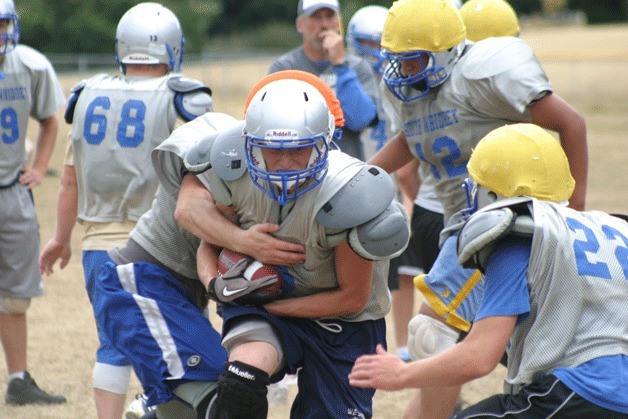It was another day at the beach for 50 Falcon football players.
Yep, just another day of running sprints and team relays with 15-yards of three-inch thick ropes while trudging through the sands of Double Bluff Beach.
“Everything we do is competitive at the beach,” said co-head coach Mark Hodson. “Everything is for points; everything is competitive. You can tell a lot about a kid when he’s playing, working hard and how competitive he is. And we get to see all three of those things.”
The Falcons arrived for their first fall practice Aug. 17. Last week, the players practiced twice a day before their first game against the Bellingham Red Raiders on Friday, Sept. 2.
This day at the beach was the second practice that Thursday. Earlier, the players were at the auxiliary field at South Whidbey High School.
The Falcons practiced on the field in jerseys and shorts from 8:30 to 11 a.m., and then four hours later the players and coaches returned to the parking lot and boarded the school buses that would take them to a place for a different sort of education.
For the next two hours, the Falcons participated in sprint relays and conditioning drills on the beach at Double Bluff. Held every season during the first
three days of fall practice, the beach activities are meant to train the players while also building the team’s unity.
The relays are also designed to instill competitiveness.
“Beach practice has hit two main things for me,” Hodson said. “One: They’re conditioning, that way when we’re on the field for two-and-a-half hours (in the morning) we don’t have to spend one minute on conditioning. So when we go to the beach even though it’s fun and everyone is laughing, they’re still running harder than they would if they were on the field.”
“The second thing is that it builds teamwork,” he continued.
“When I split up the teams, there are freshmen through seniors on each team. So I have six different teams with freshmen and seniors, then all of a sudden those incoming freshmen know seniors by their first names. They’ll know and see each other in the hallways and see each other at lunch. It builds the team, so when school starts they know each other.”
Grouped into six teams of nine players each, the goal was to win each relay drill, accumulating points for the team. Cones about 50 meters apart designated the start and stop points. Each team had a football in place of a baton to hand off.
Teams were docked points if the ball was mishandled on a handoff or fumbled. The sand made the trips difficult as the beach gave way and slid out from underneath the ball carrier, and in the case of a fumble, much harder to handle the ball.
Along with the running relays, Hodson and co-head coach Andy Davis also had the players carry large ropes that are used by workers at the Clinton ferry dock.
The ropes are between 10 and 15 yards, and depending on the tide, become soaked and even heavier for players to drag. A usual drill would be to carry the rope out to a buoy 100 yards away and back, and then hand it off to the next player.
This, among other things, takes a toll on each players’ body and even their minds at the end of the day.
With players doubled over and heaving for air and gulping water, Hodson reiterated the toughness of the beach sessions.
“If I were to do on the field what I had these high school kids do on the beach,” he continued, “they would be dropping like flies. But because it’s at the beach and they don’t have a shirt on, it’s fun.”
Coaches called incoming freshmen to perform miscellaneous and school-spirit related tasks. A player’s name was yelled out, then he was instructed to name each member of his respective team or sing the entire fight song. The spectating players and coaches began laughing.
Soon after though, the players returned to their cones and relays on the beach.
The beach practices may be a treasured tradition of Hodson and Davis, but it didn’t originate on South Whidbey’s shores.
“Every PLU (Pacific Lutheran University) alumni knows about beach practice.” Hodson said. “Guys at Edmonds-Woodway and King’s also do beach stuff, but it’s a PLU thing.”
Hodson reiterated the importance of forcing his players to bond through adversity like beach days and two-a-day practices.
“That’s an experience that’s unlike anything they’re going to do in sports,” he said. “That builds memories, that builds team, that builds community. There’s alumni that show up at the beach because that’s a memory they have. What an awesome memory of high school football: Going to the beach.”



